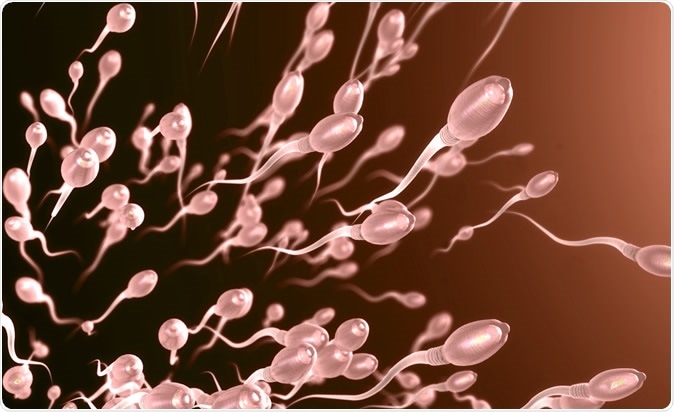
3d illustration of sperm cells. Image Credit: Christoph Burgstedt / Shutterstock
Over the last few decades, fertility in men has gone down significantly. Recent studies show a 50% to 60% reduction in total sperm count over the years 1973 to 2011 in the developed nations of the world. This is merely the continuation of a trend that began to be seen in the 1940s.
Other studies suggest that testosterone levels are also falling over time. The reasons for these changes are not clear but may have to do with endocrine disrupter chemicals in the environment, pollution in the air we breathe, and lifestyle or behavioral factors like smoking and drinking.
However, diet is another significant potential contributor to this downward turn in semen quality. In Western countries, the kind of food eaten routinely has undergone a marked transformation. More and more calories, meat, cheese, oils, and fats, sugars, and refined flour are being ingested rather than healthy food.
Some earlier studies have tried to find links between individual nutrients and semen quality as well as other chemicals that reflect the health of the male reproductive system. However, recent studies focus on diet as a whole. A missing element, however, in many studies, is the impact that local variations in the diet have upon testicular function as mirrored by markers like semen quality, the volume of the testes, and the levels of serum reproductive hormones.
The study
The researchers wanted to see if there was any link between the kind of food eaten by the average young man in Denmark and the markers of testicular function. Their theory was that healthy diets would show an association with healthy semen.
The researchers ask young men attending the compulsory physical fitness test at 18 years of age in Denmark to participate in the study. Those who are willing then fill out their demographic characteristics and lifestyle behaviors in the form supplied, give samples of blood and semen, and are examined physically for weight and height, and ultrasonic volume of the testes. From 2008 onwards, the food frequency questionnaire has been added. It is this latter group that is the focus of the current study.
There were almost 3,000 men who participated in the present study. The food patterns were classified based on the food frequency questionnaires as a typical Western, prudent, open-sandwich, and vegetarian-like pattern.
- The Western diet included a higher number of pizzas, fries, red and processed meat, snacks, refined grains, sugary beverages, and sweets.
- The prudent diet had higher amounts of fish, chicken, fruit and vegetables, and water.
- The open-sandwich pattern had larger amounts of cold processed meat with whole-grain bread, mayonnaise, condiments, cold fish, and dairy.
- The vegetarian-like pattern included vegetables, soy milk, eggs, but no red meat or chicken.
The median age was 19 years, and 78% of them had a normal body mass index (BMI).
The findings
The researchers found an overall similarity in carbohydrate intake, but significantly different intakes of fiber, total sugar, and added sugar between the diet patterns. Specifically, the Western diet had more added sugar and less fiber, the prudent less added sugar, the open-sandwich more fiber, and the veg-like more added sugar. The total fat intake was also similar, but there were more long-chain omega-3 fatty acids in the prudent diet, mostly because of the fish intake. Other differences included carotenoid and vitamin C and B intake.
Overall, the median total sperm count was 140 million. The median testosterone level was 524 ng/dL. 55% had sperm concentrations above 40 million/mL, and 17% below the lower limit of normal.
However, group-wise, the prudent pattern group had the highest median total count of 167 million, and the Western diet group the lowest, at 122. The veg-like pattern and the open-sandwich pattern groups had median counts of 151 and 146 million, respectively. The highest sperm concentration compared to the Western-style group was in the veg-like and the prudent groups. This trend reappeared with all the semen parameters as well as testicular volume, as well as reproductive hormone levels.
Overall, following the Western diet, most of the time-correlated with having a 20% higher chance of having one or more parameters of semen below the lower reference limits set by the WHO – in other words, low-quality semen. A lower level of inhibin B, and a lower inhibin B to FSH ratio, was also more likely in this group. This suggests a lower rate of sperm production.
The prudent diet correlated with a higher quality semen sample. The open-sandwich pattern was linked to a higher motile sperm count and the veg-like pattern with a more significant percentage of normal sperm.
The researchers point out the possible role of chance or the differences in the nutrient intake across groups. However, they suggest that greater adherence to the Western pattern of diet is linked to lower hypothalamus function and lower rates of sperm production. They say, “If the associations reflect causation, adherence to a Western diet may lead to a combined primary and secondary endocrine reduction of spermatogenesis.”
Conclusion
If the study findings are validated, say the researchers, these findings could “suggest the possibility of using dietary intervention as a potential approach to improving testicular function in men of reproductive age.”
Journal reference:
Nassan FL, Jensen TK, Priskorn L, Halldorsson TI, Chavarro JE, Jørgensen N. Association of Dietary Patterns With Testicular Function in Young Danish Men. JAMA Netw Open. 2020;3(2):e1921610. doi:10.1001/jamanetworkopen.2019.21610